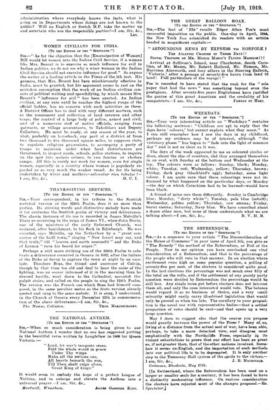WOMEN CIVILIANS FOR INDIA.
[To THE EDITOR OF THE "SPECTATOR.") Sin,—" As for the objection that the [Emancipation of Women] Bill would let women into the Indian Civil Service, if a woman like Mrs. Besant is to exercise so much influence for evil in Indian politics, we do not see why a wiser woman in the Indian Civil Service should not exercise influence for good." So argues the writer of a leading article in the Times of the 5th inst. His premiss, that Mrs. Besant has been mischievously effective in India, must be granted, but his argument seems to rest on the mistaken assumption that the work of an Indian civilian con- sists of political writing and speechifying, by which means Mrs. Besant's " influence for evil " has been exerted. An Indian civilian, at any rate until he reaches the highest rungs of the official ladder, has no concern with such activities as these. A District Officer has to deal with very different matters, such as the assessment and collection of land revenue and other taxes; the control of a large body of police, armed and civil, and of a numerous staff of native officials, ranging from patwaris, or village accountants, to Tahsildars and Deputy Collectors. He must be ready, at any season of the year, to visit, probably on horseback, any part of a district of from two thousand to five thousand square miles, to suppress riots, to regulate religious processions, to accompany a party of troops to maintain order when local disturbances are threatened, to inspect roads, schools, police stations; to inquire on the spot into serious crimes, to run famine or cholera camps. All this is surely not work for women, even for single women, especially in a country where woman is popularly re- garded as so very much the weaker vessel. As for its being undertaken by wives and mothers—solvuntur rim tabutae !-


































 Previous page
Previous page